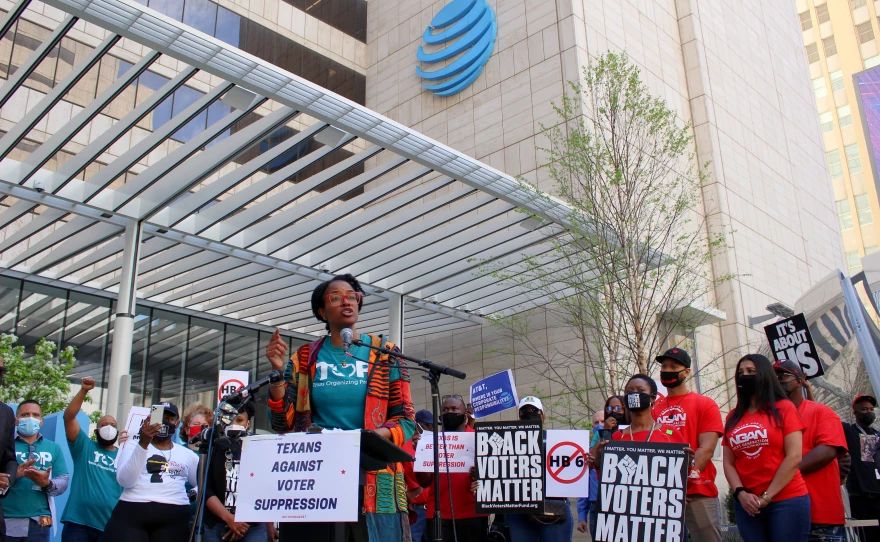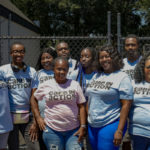
When Donald Trump was elected president, Brianna Brown knew what to expect – and she was ready to fight.
That’s because, as the co-executive director of the Texas Organizing Project, she has seen firsthand how “vicious and ruthless” the extreme right can be. The 14-year-old organization engages in grassroots organizing efforts to get Black and Latino voters to the polls, and to ensure that the candidates it backs work on their behalf once in office.
“When Trump won, we said, ‘Welcome to Texas,” she says. We know “how relentless the radical right is. We see it every day.”
Indeed, it hasn’t been an easy road. The past few years, she and her team have seen Texans suffering under especially stringent abortion bans that have put women’s lives in danger; Governor Greg Abbott’s outright refusal to address gun violence, despite there being at least seven mass shootings in the state during his time in office; and a crumbling infrastructure that leaves residents without power amid worsening storms, and jeopardizes their access to clean water.
On the ground, Brown adds that she and her team are also experiencing increased hostility – from alt-right Texas citizens, and from the representatives they elect to state and local offices.
But TOP has steadily worked to improve representation among politicians – and to improve residents’ lives. Its work is largely focused in Dallas, Harris and Bexar Counties, where significant concentrations of Black and Latino Texans live. Today, over 350,000 members and supporters take part in on-the-ground, door-to-door work toward electing progressive candidates and holding them to task.
And these efforts yield real results. In 2018, for example, TOP put resources into getting Judge Lina Hidalgo successfully elected in Harris County, despite her being a young Latina woman going up against a white, conservative incumbent.
The organization supported her candidacy because of Hidalgo’s pledge to help overhaul parts of the criminal justice system. Texas imprisons more people than any other state – and while only 4 in every 10 Texans is Black or Latino, those two groups are represented in 7 in every 10 prisoners in the state. A significant portion of these folks have not even been convicted of crimes – they are imprisoned simply because they cannot afford to pay bail.
In 2019, Hidalgo used her newfound power to sanction a bail-reform measure that issues bonds to low-level, nonviolent misdemeanor offenders – before releasing them.
This success, says Brown, is a prime example of the organization’s “two-fist approach: a win of political power translating into a tangible, material policy win.”
Problem-Solving From All Sides
In its early days, TOP solely focused on working with elected officials on policy prescriptions. But “a couple of years in, it became clear that in order to build the kind of power that determines our own futures, we had to make sure we were intervening in who got elected,” Brown says. “That’s how you build a Texas that reflects your values.”
Today, the organization assesses candidates and their policy positions through the lens of Black and Latino constituents’ needs. “That’s always been an essential part – understanding the necessity of what needs to change, and what the policies are” that must be revisited, if not thrown out altogether, Brown says.
And once the nonprofit backs candidates, it sticks with them throughout their terms. In the case of Hidalgo, for instance, TOP organized to help the judge win re-election earlier this year.
TOP also engages in environmentally focused work – another hot-button issue in a state packed with climate-change-denying politicians. But a series of severe weather events has revealed deep cracks within not just the state’s infrastructure, but the process of emergency funding distribution as well.
“The way that people get relief, traditionally, has gone through the people with money – with white folks at the top of the list,” Brown says. Hidalgo, in response to this problem, created the Greater Houston 2021 Winter Storm Relief Fund, which raised over $15 million to assist the area’s most vulnerable families.
Another victory: In several counties, TOP launched campaigns to encourage official acceptance of Enhanced Library Cards as valid forms of ID.
Identification is “a real challenge for undocumented communities,” Brown says. “They need to have some form of ID to allow them to interact with the world, otherwise we cheat them out of pipelines.” Plus, she adds, “our communities have more chances of interacting with law enforcement, just because they are people of color. Having identification [in those situations] is really important.”
This is the sort of understanding, and the sorts of changes, that TOP will continue to emphasize heading into 2024. Brown says this, rather than lofty rhetoric, is what gets people to the polls.
“It makes a lot of sense why people opt out,” she states. “I get frustrated with people who don’t understand voter apathy. If the system doesn’t deliver, and nothing changes, why continue to do a thing? That’s the definition of insanity.”
Rather, “we need to make sure people are seeing the impact of their vote” – which is why, she adds, “our job [at TOP] really starts after the election.” ◼



